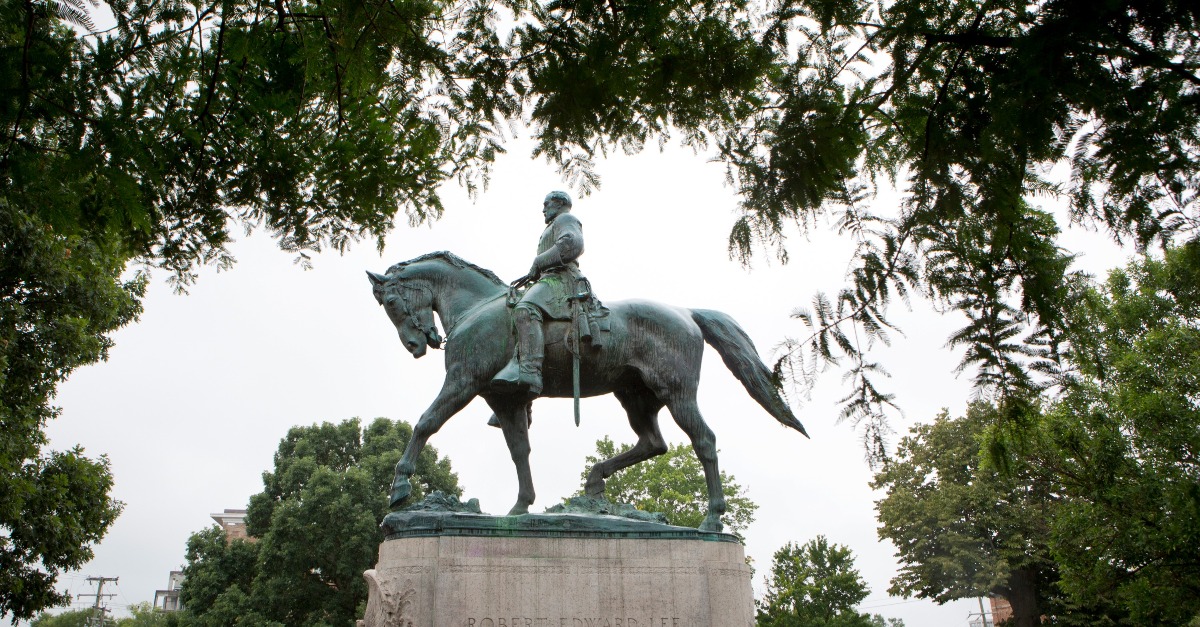Alexandria doesn’t have a robust Confederate history. After Virginia seceded from the union, the city, located just outside Washington, D.C., assembled its men to fight for the South — and was promptly occupied by thousands of Federal troops for the duration of the Civil War. Any Confederate mystique it still claims derives more from the fact that Robert E. Lee grew up there than its role in the greater conflict.
Videos by Rare
Nonetheless, the site where those men briefly rallied is today marked by a statue of a Confederate soldier, standing at the intersection of Washington and Prince Streets. I’ve seen it many times. Old Town Alexandria is one of my favorite places to have a drink after work and I often drive past it, cast in bronze, facing south of course. Every time I do, it makes me think — about the fact that I’m about to enjoy a beer in what was once a slave port, the monstrousness of human chattel, the horrors of the conflict that resulted and the determination to glorify the lost cause afterwards.
Alexandria today is mulling the removal of that statue, though a state law means they probably won’t be able to. Other cities, however, are moving quickly. Last night, four Confederate statues in Baltimore were removed under cover of darkness. Earlier today, a Maryland sculpture of Justice Roger B. Taney, who wrote the Dred Scott decision, was torn down. The mayor of Lexington, Kentucky, has pledged to haul away a statue of a Confederate soldier and another of former vice president John C. Breckinridge who fought for the South. And yesterday in Durham, North Carolina, an impatient mob toppled another Confederate.
RELATED: Why asking “What about antifa?” is not a good response to white nationalism
Social change can take decades to come, but when it does it often takes the form of a deluge, sweeping away traditions and counterarguments, changing the way we look at everything. That’s what happened with the Confederate flag fluttering over South Carolina’s capitol building in 2015. Seemingly untouchable, Dylann Roof’s horrific murder of nine African Americans at a church suddenly had many — including me — wondering how it had flown in defiance for so long. After that, it seemed the next logical step was to rename roads honoring Confederates, like the Jefferson Davis Highway in Arlington where I lived for seven years. No African American should ever have to list on his return address the name of a man who committed treason to keep him in chains.
But a Confederate statue is something different. We certainly shouldn’t build new ones, but perhaps we should pause before tearing down the old ones. Because, while Charlottesville shows that a cretinous minority still glorifies those statues, the vast majority, I think, see them as I do: as an invitation to consider America’s original sin and the enormous bloodshed that followed. Depose too many of those bronze equestrians and you could end up blotting out history rather than respecting it. Yes, it would have been nice had they never been erected, but they were, many of them for terrible reasons, and that in itself seems worth remembering. Such recollection might be uncomfortable, but this was an uncomfortable time in our history. It shouldn’t be sterilized.
RELATED: Here are three things we must remember when we talk about Charlottesville, race and free speech
Also where do we draw the line? Last year hundreds gathered at the statue of Teddy Roosevelt in front of the American Museum of National History in New York to demand its removal — should they be placated? Should we pave over the FDR Memorial because its honoree interned tens of thousands of Japanese Americans during World War II? Should the Jefferson Memorial go since it pays tribute to a slave owner? Historical figures are complex, often succumbing to some evils of their time even as they push back against others. The wickedness of Confederate generals outweighs the good — no question — but agreeing to banish them could still send us down a slippery slope where that nuance gets lost.
I’m not one to praise the pundit David Frum but he had a really good idea on Twitter last night. Instead of tearing down Confederate statues, he suggested, why not build memorials on the sites of lynchings? Add to our historical remembrance rather than subtract it? Something to consider.



